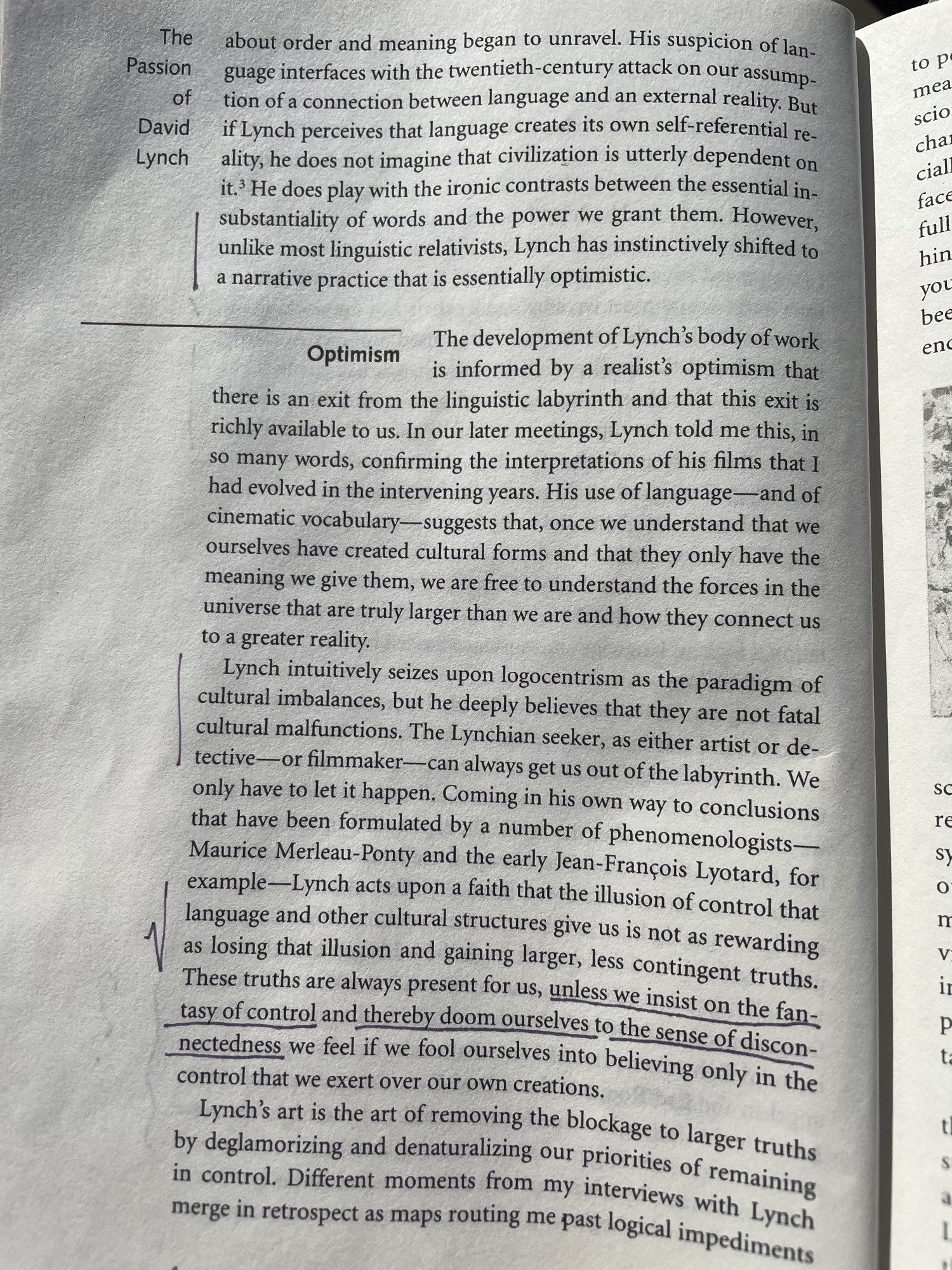(fragments after Part 1 that didn't go where I wanted them to. but I still wrote them, and there are no rules, so here you go!)
...Continued from Part 01a.
lol we're like 2 minutes into Episode 1, but this is my notebook so we can go in whatever order!
REMINDER: this is just for fun!! I don't care if I'm right or wrong! I'm talking about my imagination and emotions, in conversation with an ambiguous creative work. THANK YOU FOR YOUR HELP IN NOT BEING MEAN TO ME
WE ACCEPT THE ILLUSION BEFORE THE REALITY
I want to talk about the Blue Velvet bird, Lou Ming's concept of "bad transformers," and the production of lumber as it related to dream-having and meaning-making. I just followed a feeling and skimmed back through The Passion of David Lynch by Martha P. Nochimson. This is, without a doubt, one of my favorite things I've ever read, and is specifically among the best media analysis / criticism that's crossed my eyes. The book is a set of essays about DL's work up through Wild at Heart. It rules!!!
And anyway I remembered that Martha discusses the presentation of imagery as "realistic" very eloquently throughout this book. She says she had a series of conversations with David that surprised her and shifted the direction of her book, including on the subjects of control and realism. I typed up several excerpts but it's too long, so here's one useful statement (excerpt as text after the photo):

The development of Lynch's body of work is informed by a realist's optimism that there is an exit from the linguistic labyrinth and that this exit is richly available to us. [...] Lynch intuitively seizes upon logocentrism as the paradigm of cultural imbalances, but he deeply believes that they are not fatal cultural malfunctions. The Lynchian seeker, as either artist or detective — or filmmaker — can always get us out of this labyrinth.
[...]
Lynch acts upon a faith that the illusion of control that language and other cultural structures give us is not as rewarding as losing that illusion and gaining larger, less contingent truths. These truths are always present for us, unless we insist on the fantasy of control and thereby doom ourselves to the sense of disconnectedness we feel if we fool ourselves into believing only in the control that we exert over our own creations.
And, I add, the disconnection between what it feels like to be you, and the cultural constrictions applied by language. You're a boy, so you behave in this way. Your name is Nick, so you act the way Nick does. To deviate from the label is to risk violence and rejection by those who believe received concepts over material, experiential truth.
REPEAT: There are people who will choose some wild bullshit they heard over hearing and accepting the honest truth of the person in front of them. I know!!! I couldn't believe it, either.
AN ASIDE ABOUT "TRUTH"
[I feel so weird trying to navigate this "don't believe everything you're told" territory, but please understand that there is a palpable difference between a trans person saying, "This is who I am," with openness and vulnerability, and someone belligerently regurgitating "that can't be, because I was told to believe something else by a person whose only motivation is control" with malice and resistance in their hearts. It is not sufficient to say you "feel" intuitively that the world is flat, because you are provably wrong; but it is deeply important that we understand ourselves and others vividly and intimately, in order to live peacefully and operate compassionately in the world.
And it's worth noting that there is a distinct overlap between people who refuse scientific truths and those who reject the personal truths of others. Even though they have also been told that the world is flat, etc. Again, it's a question of legitimacy and trust. Why some people are hungry to refute physical consensus on our shared world, and yet will also refute another person's right to — or even ability to — be non-cisgender and non-heterosexual, which is provably true because we exist... it's a bizarre one.
Those who fail to understand themselves — or reject their own understanding because it doesn't fit what they've been told — are the people who cause the greatest harm to others. If you can't tell the difference, please, slow down and breathe... there we go... sh sh sh......... and stop talking for a couple of years.
Anyway, as we go forward, I think that assertions re: David Lynch's work "seeking intuitive truth" are about psychological, personal, and interpersonal truth — meaning, feeling, trying to be our best selves in concert with others — not about reality-denying conspiracy shit. TPoDL, page 7:
Lynch's films encourage spectators to perceive the hollowness of linguistic structure and then discover a more complex form of connection through the subconscious.
This is all a digression, but I'm allowed to digress! I originally apologized at the end of this, and then got fatigued before going on to other topics. Instead I'm just gonna post this and move on! Skipping the Bird and Wood and Bad Transformers for now.
△△
Continued in Part 02.